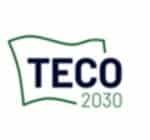Key milestone for one of the world´s most powerful hydrogen fuel cells, TECO 2030 on schedule for first customer deployment H1 2024

TECO 2030 has successfully injected its fuel cell system with hydrogen and created emission free hydrogen-electric power. The 400kW module represents the most compact and energy dense system available for marine vessels and other heavy-duty equipment.
By 2030, the target is to produce a capacity of 4.000 units per year at TECO’s giga factory in Narvik, Northern Norway. In that way, TECO wants to potentially reduce the amount of CO2 emissions similar to the number of annual emissions from countries like Sweden or Portugal and cities like Berlin or Toronto according to the C40 Knowledge Hub.
TECO’s fuel cell technology offers a compelling alternative to traditional diesel machinery, addressing critical environmental concerns, while also relieving the pressure on port- and city grid capacity, and the use of critical materials. The switch to fuel cells signifies a major step in supporting the clean transition targets under the European Green Deal, the U.S. Inflation Reduction Act and other frontrunner regions.
“A fuel cell is the next generation of engines and power generators, where hydrogen is the fuel,” says an enthusiastic Tore Enger, Group CEO, TECO 2030. “Operating one FCM400 unit instead of a diesel generator, saves our planet from over 9000 tons of CO2 emissions – or consuming over 3.5 million liters of diesel – during 35,000 hours of operations.”

From right Prof. List, CEO of AVL List GmbH and Tore Enger, CEO of TECO 2030 in front of the FCM400 on the testbed in Graz, Austria.
Since the IPO in October 2020, TECO has invested heavily in its marine and heavy-duty fuel cells development, which has resulted in its leading fuel cell system.
Over the past few months, the company has built and installed the FCM400 into the test bench in Graz, where the goal has been to utilize the FCM400 to produce electricity from hydrogen. The first hydrogen has now been injected into the fuel cell module, validating the technology performance.
The system will undergo further testing, with the intention to deploy the first system during the first half of 2024. The manual production of FCM400 systems will continue at the technology development partner AVL in Graz, Austria for the next few units before moving the production to Narvik, Norway during the first half of 2024. The Narvik site is already well underway with manual production of fuel cell stacks.
The innovative fuel cell system is an advanced clean energy generation system. The attributes of the modular 400kW fuel cell system include industry leading energy efficiency, inherent safety concept, leading weight/size dimensions and component design, lifetime, and rapid dynamic load response.
“A remarkable accomplishment, our FCM400 system has officially been tested with hydrogen and produced electricity as expected and the performance data collected proves our expectation of how we have met or outperformed our own expectations,” says an engaged Tore Enger. “The road to a better and more sustainable future is becoming clearer and clearer to us as we reached this enormous milestone in our company’s history,” Enger concludes.
Source: TECO 2030
Source link
